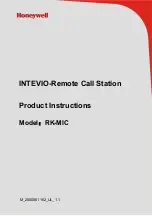
D R AGON FLI ES
T
H
E
D
R
A
G
O
N
F
L
Y
of the world
*
*
with apologies to entomologists everywhere
hank you for purchasing Blue’s Dragonfly
microphone, a classic, precision-engineered recording
tool combining old world, hand-crafted quality and cutting-
edge technology. Like its winged namesake, the Dragonfly
is fast, maneuverable, beautifully engineered and wonderful
to look at. But unlike the insect version, Blue’s Dragonfly
won’t buzz around the recording studio (and it won’t
devour mosquitoes).
To familiarize yourself with the Dragonfly’s specialized
and unique features, please take a moment to read through
this manual and also try out the suggested recording tips.
With proper care and feeding, the Dragonfly will reward
you with many years of exquisite recordings.
To begin with, the Dragonfly is a pressure-gradient
cardioid condenser microphone, employing Blue’s single-
membrane large diaphragm capsule. This hand-tuned
and tested capsule is covered by a select 6-micron
mylar film, sputtered with a mixture of gold and
aluminum. Enclosed within a rotating spherical
grill, the capsule can be positioned and adjusted in
the smallest of spaces. This innovative design offers
fine-tuning and precise placement to please the most
discerning recordist, combined with an ease of use
that is without equal among either vintage or contem-
porary microphones.
The Dragonfly’s electronics are Class A discrete, with
transformerless output. In plain English, this means that
the sound which has arrived at the diaphragm and has
been converted to electrical energy (transduced) is then
amplified as accurately as possible, with minimal coloration
and absolutely no integrated circuits (AKA — “IC’s”) in the
signal path. Thus, the Dragonfly’s overall sonic character
is superbly detailed and pleasing to the ear, making it
an ideal microphone for recording vocals, drums and
percussion, electric guitar, bass and any acoustic
instrument including “difficult” sources like saxophones
and stringed instruments.
T






















